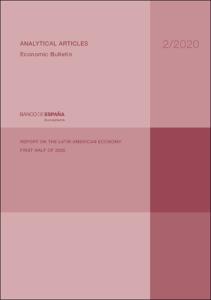Registro completo de metadatos
| Campo DC | Valor |
|---|---|
| dc.coverage.spatial | América Latina |
| dc.date.accessioned | 2020-05-25T11:18:05Z |
| dc.date.available | 2020-05-25T11:18:05Z |
| dc.date.issued | 2020-04-29 |
| dc.identifier.uri | https://repositorio.bde.es/handle/123456789/12626 |
| dc.description | Artículo de revista |
| dc.description.abstract | This article analyses the recent performance of the main Latin American economies (Brazil, Mexico, Argentina, Colombia, Chile and Peru). Economic developments in the region have progressively been influenced by the global spread of the coronavirus COVID-19 pandemic. Although it has reached Latin America with some delay compared to Europe and the United States, it shows a similar pattern of dissemination. Moreover, the region faces this pandemic in an economic situation which had already beforehand shown signs of weakness owing to various idiosyncratic reasons, related in part to the bouts of social tension in the final stretch of last year. Some factors, such as high labour market informality and the improvable quality of some institutions, may act as amplifiers of the impact of the health crisis. From the economic standpoint, the pandemic is affecting the region through various key channels, namely the trade, commodities, tourism, financial and domestic demand channels. The national containment measures, the impact of the pandemic on the population, the global nature of the shock and the differential effects on the region are seeing analysts revise their GDP forecasts for 2020 notably downwards, with a balance of risks tilted to the downside. The monetary and fiscal authorities have responded, swiftly adopting measures. Although the region has in recent years consolidated progressively more robust monetary and fiscal policy arrangements, it has less monetary and fiscal space than at the start of the 2008-2009 crisis. Moreover, the Latin American economies, with the exception of Peru, have notably increased their external debt since 2008, though they have more international reserves than in the previous global crisis. Against this background, the resolute response by national policies should ideally be supported by a coordinated global response, led by the main multilateral agencies and geared to minimising the possible long-term adverse effects on the region’s economies. Three boxes accompany this report. The first considers the causes and potential effects of the social tensions in some of the region’s countries in the closing months of 2019. The second examines the process of integration of Latin America into global trade and its results, analysing the challenges outstanding if the region is to fully reap the benefits of greater trade integration. The third sets out some simulations made on the basis of a global macroeconometric model to illustrate the potential adverse effects of COVID-19 on economic activity in the main Latin American economies. |
| dc.format.extent | 29 p. |
| dc.language.iso | en |
| dc.publisher | Banco de España |
| dc.relation.ispartof | Economic Bulletin / Banco de España, 2/2020 |
| dc.relation.hasversion | Versión en español 123456789/11941 |
| dc.rights | Reconocimiento-NoComercial-CompartirIgual 4.0 Internacional (CC BY-NC-SA 4.0) |
| dc.rights | In Copyright - Non Commercial Use Permitted |
| dc.rights.uri | https://creativecommons.org/licenses/by-nc-sa/4.0/deed.es_ES |
| dc.rights.uri | http://rightsstatements.org/vocab/InC-NC/1.0/ |
| dc.subject | COVID-19 |
| dc.subject | Pandemic |
| dc.subject | Informality |
| dc.subject | Containment measures |
| dc.subject | Monetary and fiscal space |
| dc.subject | Uncertainty over politics and over economic policies |
| dc.subject | Trade integration |
| dc.subject | Simulation |
| dc.subject | International economy |
| dc.title | Report on the Latin American economy. First half of 2020 |
| dc.type | Artículo |
| dc.contributor.corporated | Banco de España. Dirección General de Economía y Estadística |
| dc.identifier.bdebib | 000469046 |
| dc.identifier.bdepub | ECBU-2020-2B-art12 |
| dc.subject.bde | Evolución y desarrollo económicos |
| dc.publisher.bde | Madrid : Banco de España, 2020 |
| dc.subject.jel | F01 |
| dc.subject.jel | F13 |
| dc.subject.jel | F21 |
| dc.subject.jel | F30 |
| dc.subject.jel | F41 |












